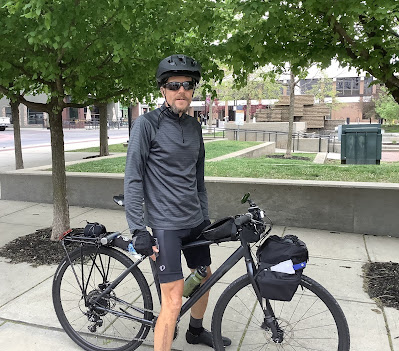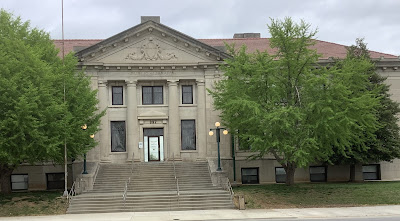skip to main |
skip to sidebar
Hartville, Missouri
A cyclist with a wisp of a pony tail out for a morning ride in the sprawling city of Springfield, the third largest in Missouri, provided an escort for me to its Carnegie, a branch of the city’s network of libraries. Todd came upon me as I was consulting my GPS and asked if I needed help. He gave me directions to the Carnegie and then volunteered to ride there with me.
He was the first cyclist I’d come upon in two thousand miles since parting with Charlie almost a month ago now. He was riding a high quality Trek with a Sunshine Bike Shop sticker, where his son worked. He had aspirations of touring and fantasized biking about Kansas, waking up by a field of sunflowers all pointed to the rising sun. I’m not sure why, maybe it was seeing how laden I was with stuff so he may have thought I had room for more, but he asked if I’d like a cat, as he had eight of them. They were good for teaching his daughter responsibility, he said, but eight was a bit much. I told him I had three back home, which he didn’t think was enough. I did travel with a German cyclist one year at the Tour de France who had a kitten he’d found along the way in his handlebar bag. It brought us plenty of extra attention. I had no need of that.
I’d been to this Carnegie before, in September of 2014, when I visited Dwight and Susan on my ride home from Telluride, but didn’t have a precise memory of where it was located. Dwight had come out of retirement and uprooted himself from his Bloomington farm to teach a computer course at Missouri State University for a year. That was before I’d discovered the Boy Scout Statues of Liberty and added them to my itinerary, so I missed Springfield’s, one of twenty-four in the state. I may have passed it, as it was just a block from the Carnegie in front of the courthouse. If I’d noticed it then, I would have gotten a couple year jump on that quest, as it didn’t begin until October of 2017 when I happened upon one in front of the library in Benton, Illinois, where George Harrison’s sister lived for a few years.
Springfield was on the way between Carnegies in Aurora and Marshfield that I hadn’t been to before. The Carnegie in Aurora had a large addition to its side, which now provided the entrance to the library. The Carnegie portrait had been relegated to the foyer of the original entrance, which was no longer used.
I camped fifteen miles before Springfield, fearful of approaching much closer, as its sprawl had a population of half a million people, the fastest growing metropolis in Missouri. I had to contend with near bumper-to-bumper traffic in the morning rush to work, but the highway had a wide shoulder, so I was in no peril. Of the hundreds of drivers, only one cretin felt the need to blast his horn at me. I could only pity the sorry soul in such a foul mood already. When I glimpsed a sign within the city limits with the word “mow” on it, my initial reaction was one of delight that Springfield was among the enlightened communities that had joined the “no mow” movement of not cutting one’s grass in the month of May to let the bees and other pollinators feast on dandelions and whatever else provided them nourishment that would otherwise be mowed down. But then my mind processed the rest of the sign, which read, “First Mow Free.” It was the sign of landscaper soliciting business, and not encouragement to let one’s grass grow.
There was no mistaking a gigantic sign thanking the volunteers of the huge Wonders of Wildlife (WOW) Museum and Aquarium, one of the largest such complexes in the world. Not only is it packed with creatures, live and stuffed, it had a room devoted to Lewis and Clark and a replica of Theodore Roosevelt's cabin, the conservationist president. It was National Volunteer Week, and this vast enterprise relied heavily on animal-loving volunteers. Ironically, the subject of volunteering had come up on Tony Kornheiser’s podcast a few days before, as one of his regular guests had just retired from the Washington Post and had been subjected to a barrage of “volunteer-shaming” by friends and acquaintances who were trying to recruit her to volunteer for this and that now that she had time on her hands. The opportunities were endless—dispensing food to the needy, teaching English as a second language, serving in animal shelters, helping at day care centers. It’s the thing to do, she was told. But she wasn’t ready for any of that. She just wanted to sit quietly at home and maybe learn to tap dance or play the ukulele.
Janina and I can certainly attest to the joys of volunteering. We’ve recently become involved in the Palos Restoration Project, a group of volunteers founded over thirty years ago to restore the forests around us to their original state, removing the many invasives, mainly honey suckle and buckthorn, that have become a painful intrusion. We have been contributing one or two three-hour shifts a week in the forest cutting and burning with a dedicated crew that we have been delighted to come to know. Their dedication is quite heartening. I recruited Charlie and he enjoys it as much as us, biking ten miles every Tuesday morning to a site just half a mile from us for the joy of being in the woods and engaging in physical labor and the camaraderie.
It has been a real pleasure to broaden our circle of friends and also to gain an intimacy with the forests around us. There are over a dozen different sites that the group works, all within a few miles of us, though work is not the operative word. The weekly newsletter announcing the locations for the week ahead refers to them as “Play Dates,” a most appropriate term.
The twenty-six miles from Springfield to Marshfield was on Historic Route 66 paralleling interstate 44. There wasn’t anyone on motorcycles following the route this day despite the ideal seventy degree weather. It had sufficiently warmed up I no longer needed the bulky wool sweater Gary in Edson had given me three weeks ago. I had been hoping to come upon a resale shop I could donate it to.
Along this route, sitting all by itself, was the unlikely site of a small building with a sign announcing “Free Store” and “donations accepted.” This I had to check out. What all would it be giving away out in rural Missouri? Would there be food? It was virtually all clothes. The pants I’d started the trip with were growing a little thin in the knees and seat. I wouldn’t mind trading them for something less worn. The older guy tending the store said most of the men’s clothes had been sent to a St. Louis store, as they were needed more there than here. He said the store was started over fifty years ago, pre-dating freecycle and its many off-shoots. A priest had initiated it, partnering it with a shelter for battered wives. The shelter is no more, but the store, and others similar to it around the state, all affiliated with a church, lives on. I was glad to donate my sweater to it, and also to lighten my load a bit and create some space in a pannier.
That weight-savings was short-lived, as soon after when I visited the Carnegie in Marshfield, which is now a county museum, the woman in charge gave me a book on the Carnegies of Iowa. I’d already read it, but was happy to have a copy of my own. It is one of several states with a book devoted to its Carnegies, including Illinois, Indiana, Nebraska, Wisconsin, Kansas and Ohio, but not Missouri.
The museum had a sculpture of Carnegie done by a local and also an ornament commemorating the library. I perused a thick notebook of clippings on the library. It celebrated the first librarian, a woman who served in the position from 1911 to 1961, retiring at the age of seventy-eight. A bench in front of the new library next door honored her. The woman in charge was proud to say Marshfield was the smallest town to receive a Carnegie, a claim I’ve heard a handful of times. There are several that had a population of around one thousand that like to make that claim.I was happy for an afternoon dousing of rain, as it allowed me to take a several hour break. I had just reached a Taco Bell when it hit. Its dollar rice and cheese burritos are the best fast food bargain around. And it was an even better bargain at this Taco Bell, as it gave a ten per cent senior discount. Taco Bell’s are always a nice oasis as they also have Gatorade on tap.













1 comment:
I just learned stuff about Springfield that I did not know. Shaming non-volunteers? Has not happened to me yet. And yes, Taco Bell has some of the best,cheap fast food going.
Post a Comment